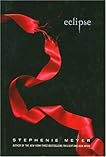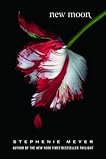 Breaking Dawn by Stephenie Meyer
Breaking Dawn by Stephenie MeyerMy rating: 1 of 5 stars
Breaking Dawn is the fourth and final book of Stephenie Meyer's vampire "love" story. This is the hardest of all for me to write about. The story is scattered across different narrators, has no story arc to speak of and drags the reader from chaotic scenes of violence to endless chapters of banal wish fulfillment. But unlike the previous books, there is no definable landing point either for critique or narrative discussion. Reading this book was like watching a slasher film on a TV with horrible reception- the picture keeps flaying out into blurry but disturbing images, only to be interrupted by ads for Hallmark and Wal-Mart: juxtapositions of physical and emotional violence with images of domesticity and consumption.
On top of that, I was bored to the point of literally needing to write "I'm bored" every 20 pages or so. Needless to say, I am not yet ready to equitably or creatively engage the issues of the text. I mostly just want to complain. But I will try to say something beyond “Why? Why? Why? Why?”
Whereas the three previous books in the Twilight Saga used awkward literary intertexts, arguably to underline a theme of Bella and Edward's relationship, Breaking Dawn has no such allusions. The first book, Twilight, has Bella reading Jane Austen’s Pride and Prejudice. At first I thought this was an embarrassing plug to encourage girls to do their English homework. After the next two books, however, I realized this was supposed to serve as meaningful literary allusion. Bella reads Pride and Prejudice then meets an aloof, severe man who then turns out to be her ideal charming counterpart. At least that’s how it’s supposed to come across. Instead, we get the evocation of a classic prototype of the rude, narcissistic, controlling man as dashing romantic hero. Mr. Darcy and Edward Cullen do have something in common: they make women swoon by being uncommunicative and evasive.
New Moon has Bella reading and watching Romeo & Juliet. Then, surprise! Bella and Edward find themselves in a situation where one lover thinks the other lover is dead and wants to kill themself as a result. We have the reinforcement of star-crossed romance being noble and romantic- i.e.: the pairing of love with tragedy and adversity, rather than health and mutuality. Not to mention the fact that both characters fantasize about suicide and death rather than separation from one another.
By Eclipse, I’d come to expect these trite intertexts, but I was in no way prepared for the bomb Meyer set off in this third book. Pride and Prejudice and Romeo and Juliet are two of the most celebrated love stories in Western literature, so surely Meyer’s third choice would be something even more exemplary of our perceptions (however troublesome) of romantic love, right? Nope. Here I was reading the book through the lens of sadomasochism, and BOOM! Meyer lobs out Wuthering Heights in the very first chapter! My eyes nearly disengaged from their sockets. Wuthering Heights is THE sadomasochistic text of all time, barring the actual writings of the Marquis de Sade perhaps. Catherine and Heathcliff threaten one another, abuse and imprison others, and ultimately die in order to torture one another from beyond the grave. While Meyer’s characters debate about the idea of Catherine and Heathcliff being romantic characters- is there anything admirable about them at all?- such in-novel debate does not change the fact that the characters are being evoked and compared. Bella even interprets Edward’s actions using Heathcliff’s dialogue. Eclipse is actually the only case of appropriate intertextuality in the whole trilogy (except maybe the brief reference to Macbeth in Twilight). Wuthering Heights’ violence, dominance and dysfunction of enmeshed, co-dependant, petulant adolescents obsessed with one another matches Meyer’s characters perfectly. What her real intent was, I shudder to imagine.
But there is no 11th grade English class intertext in Breaking Dawn, the final book. Instead, we get Bella’s continually bruised, bleeding, ripped body that eventually (and painfully) transforms into a goddess-like body of a sex object. As usual, she finds continually creative ways to be secretive regarding her real feelings, resorting to manipulation and oftentimes begging in order to be listened to or have her desires responded to. She hides her suffering (physical and emotional) from her protectors (husband, male best friend/father/step-father/intrusive sister-in-law, dissociated mother) and when her injuries are too visible to be hidden, she convinces herself that there’s nothing wrong. This includes her waking up on her wedding morning covered with bruises from her husband’s (vampire) passion. She spends the morning trying to assuage him that the bruises don’t hurt…
Here is where I need about 50 more pages to talk. Fortunately, I’ve given myself a year to work on this text and these issues. So I’ll stop now.
Conclusion to my prolegomena: I find nothing redeemable or enjoyable about these books or these characters. So much suffering, so much guilt, so much dissociation, lying, SARCASM, anger, SARCASM, violence, self-contempt, not to mention the sickening paring of perfect family domestic life with gratuitous conspicuous consumerism. The Cullens are supposed to be the most generous and loving family ever to live, and yet they have millions of dollars just sitting around being spent on fashion, luxury cars and private islands. The Cullens are angelic immortals yet they keep $40,000 in loose change rather than, say, spending their eternal lives giving it away to those who actually need to eat. Also- while I’m on a Cullen rant- I thought it was problematic that Dr. Cullen kept purchasing blood from the hospital for his new vampire family members, but the only issue raised about it was the expense, not the fact that donated blood is there to save human lives, not sustain the appetites of newborn vampires. But I digress…
So many people I trust, value and respect have found great meaning in these stories. Now begins the journey of trying to understand why.
View all my reviews >>












